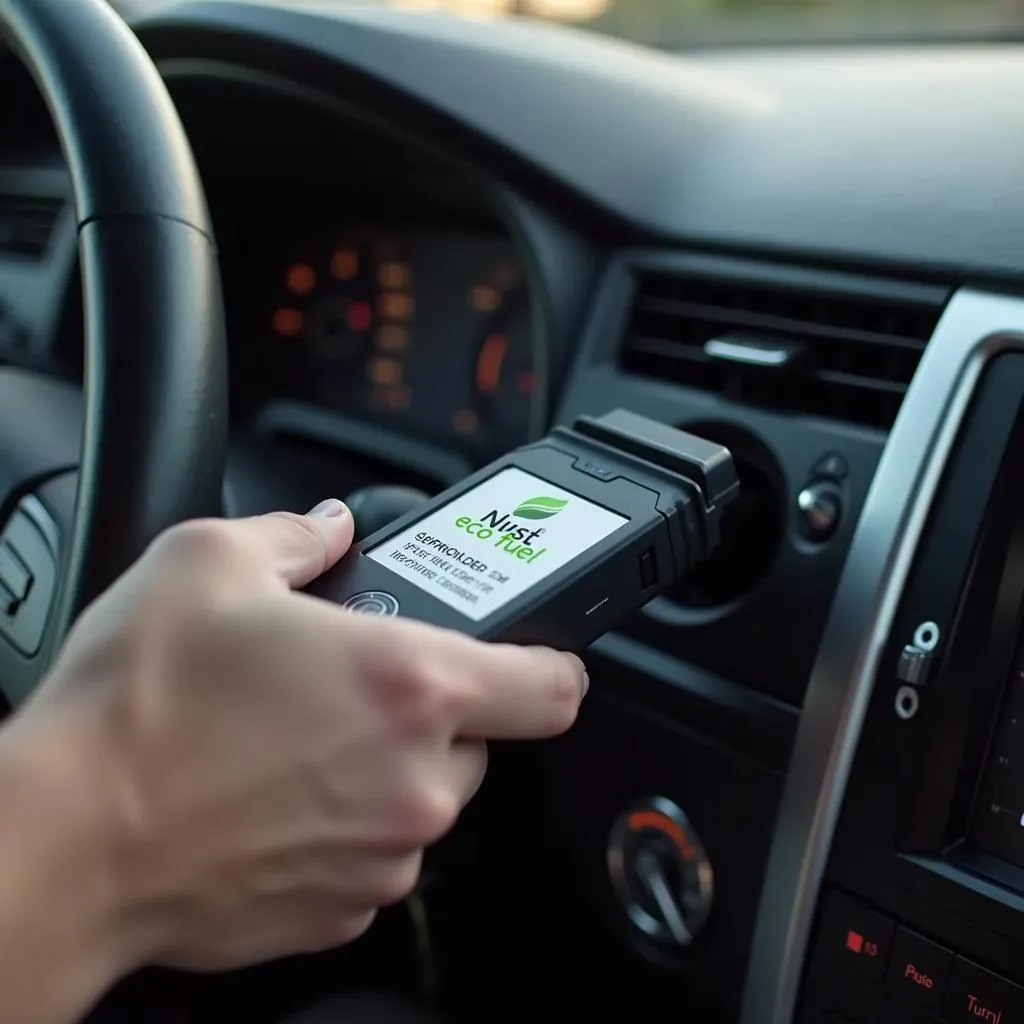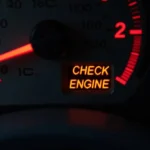The quest for better fuel efficiency has driven many car owners to seek aftermarket solutions, and “eco fuel OBD2” devices have emerged as a popular choice. These small gadgets, often advertised as miracle workers for your car’s fuel economy, claim to optimize your engine’s performance through the OBD2 port. But do they live up to the hype? This article delves into the world of eco fuel OBD2 devices, separating fact from fiction and helping you make an informed decision.
Understanding OBD2 and Its Role in Your Car
Before we dissect the claims of eco fuel OBD2 devices, it’s crucial to understand what OBD2 is and how it functions. OBD2 stands for On-Board Diagnostics, generation two. It’s a standardized system that allows external electronics to communicate with your car’s computer, often referred to as the Engine Control Unit (ECU). Mechanics and car enthusiasts use OBD2 scanners, like the ones featured on OBDFree, to read diagnostic trouble codes, monitor engine performance data, and identify potential issues.
The Alluring Promises of Eco Fuel OBD2 Devices
Eco fuel OBD2 devices typically market themselves as fuel-saving wizards capable of boosting your car’s MPG significantly. They achieve this, they claim, by:
- Optimizing Fuel-Air Mixture: The device supposedly adjusts the fuel-to-air ratio entering the engine, ensuring a more efficient burn.
- Modifying Ignition Timing: By tweaking the ignition timing, these gadgets claim to optimize the combustion process, leading to better fuel economy.
- Adjusting Transmission Shifting: Some devices promise smoother and more fuel-efficient gear changes by manipulating the transmission’s shift points.
These claims, while attractive, often lack the scientific backing to support them.
Debunking the Myths: Why Eco Fuel OBD2 Devices Often Fall Short
While the idea of a simple plug-in device revolutionizing your car’s fuel efficiency is tempting, the reality is often disappointing. Here’s why:
- Limited ECU Control: OBD2 primarily functions as a diagnostic system. While it allows for some limited modifications, it doesn’t provide comprehensive control over critical engine parameters like fuel-air mixture or ignition timing.
- Manufacturer Optimization: Modern cars come with highly sophisticated ECUs meticulously calibrated for optimal performance and fuel efficiency based on years of research and development. These devices are pre-programmed with specific parameters for your car model, making drastic changes through external devices challenging and potentially detrimental.
- Lack of Scientific Evidence: Many eco fuel OBD2 devices lack independent, verifiable testing to support their bold claims. Testimonials and online reviews, while sometimes compelling, are not a substitute for rigorous scientific evidence.
 Eco Fuel OBD2 Device Plugged In
Eco Fuel OBD2 Device Plugged In
The Potential Risks of Using Eco Fuel OBD2 Devices
While some eco fuel OBD2 devices might be harmless, others can pose potential risks:
- Voiding Your Warranty: Installing unapproved aftermarket devices, especially those tampering with your car’s ECU, can void your manufacturer’s warranty.
- Engine Damage: Incorrect modifications to critical engine parameters can lead to engine damage or reduced performance over time.
- False Sense of Security: Relying solely on such devices might lead to neglecting other proven fuel-saving practices, like regular maintenance or driving habits.
Expert Insight: A Mechanic’s Perspective
“I’ve seen many drivers drawn to the promise of quick fixes for fuel efficiency,” says John Miller, a seasoned automotive technician with over 20 years of experience. “While I understand the allure, it’s essential to approach these devices with a healthy dose of skepticism. Instead of looking for shortcuts, focus on proven methods like regular maintenance, tire pressure checks, and adopting fuel-efficient driving habits.”
The Verdict: Proceed with Caution
While the idea of an eco fuel OBD2 device magically improving your car’s fuel economy is appealing, the evidence supporting their effectiveness is often lacking. While some devices might offer marginal gains, the potential risks and lack of scientific backing make them a gamble. Instead of relying on quick fixes, focus on proven methods for improving fuel efficiency:
- Regular Vehicle Maintenance: Ensure your car is properly tuned up, with clean air filters, fresh spark plugs, and correct tire pressure.
- Fuel-Efficient Driving Habits: Avoid aggressive acceleration and braking, maintain a steady speed, and minimize idling.
- Choosing the Right Vehicle: If fuel efficiency is a top priority, opt for a vehicle known for its fuel-saving capabilities.
FAQs About Eco Fuel OBD2 Devices
Q: Can an eco fuel OBD2 device actually damage my car?
A: While not all devices are harmful, some can potentially cause engine issues if they make incorrect modifications to critical parameters.
Q: Are there any legitimate fuel-saving devices for cars?
A: Some devices, like tire pressure monitoring systems or performance chips from reputable manufacturers, can contribute to fuel savings, but it’s essential to choose wisely and do your research.
Q: What’s the best way to improve my car’s fuel economy?
A: The most reliable ways to enhance fuel efficiency are through regular maintenance, adopting fuel-efficient driving habits, and choosing a fuel-efficient vehicle.
Looking for Reliable Car Diagnostic Information?
If you’re interested in learning more about OBD2 codes, specific car models, or need help understanding your car’s diagnostics, explore the wealth of resources available on OBDFree.
- Find specific OBD2 codes, like the C1187 OBD2 code, and their meanings.
- Explore information tailored to your car model, such as the OBD2 Honda CR V page.
- Learn about popular OBD2 scanners like the OBD2 Innova 3100.
Understanding your car’s diagnostics is key to ensuring its optimal performance and longevity. While eco fuel OBD2 devices might seem like an easy solution, a informed approach focusing on proven methods is always the best path to better fuel efficiency and overall car health.
Need further assistance with your car diagnostics or have questions about OBD2 scanners? Our team of experts is available 24/7 to help. Contact us via WhatsApp: +1(641)206-8880, or email us at [email protected].

